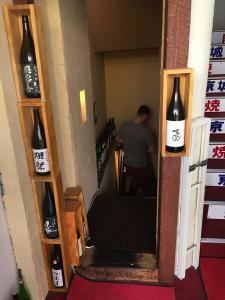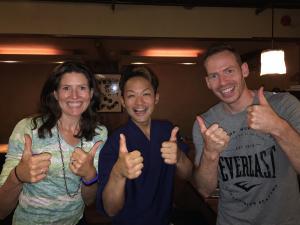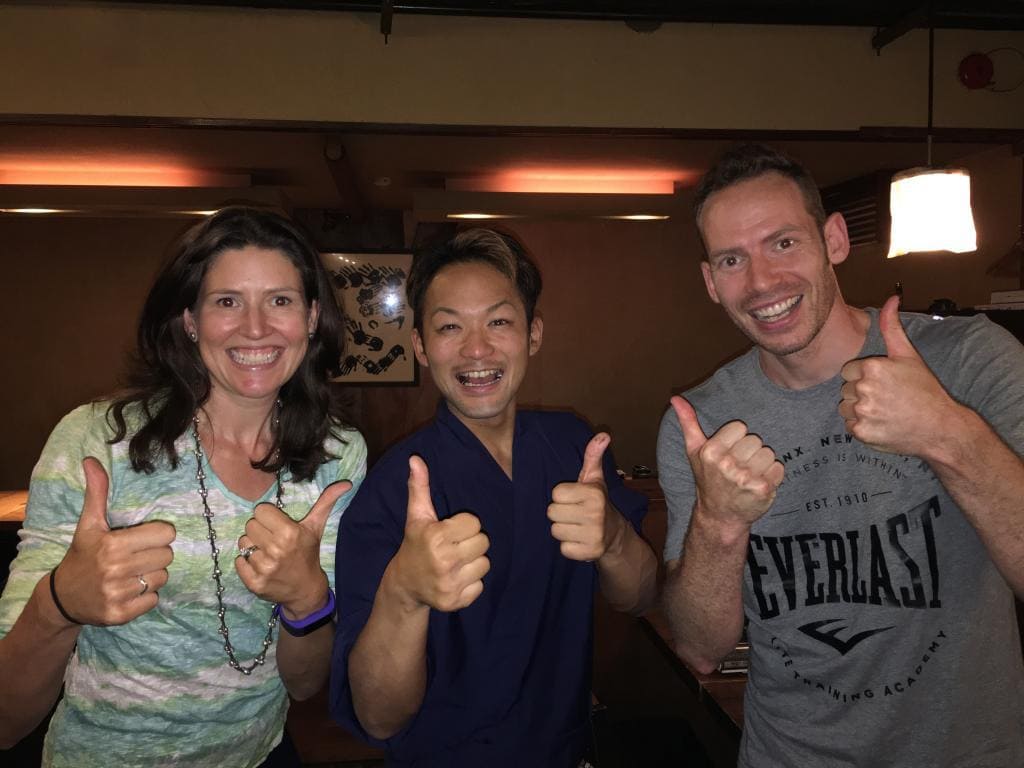How many morning or “start-up” meetings have you been part of that are fun and invigorating?
I bet none as energetic and the one that Tim Wolput and I participated in recently at the Japanese izakaya restaurant chain Teppen in Tokyo.
Adventures with Tim Wolput
When I was back in Japan in May, I caught up with my friend Tim, a native Belgian who has lived in Japan for over 20 years and who has a knack for uncovering interesting learning experiences in Japan about Lean, kaizen, and Japanese culture.
I met Tim only a month before I moved back to the U.S. after living in Tokyo for 18 months when I joined him to visit two Japanese companies. Since then, we have found a way to get together multiple times, including when I was back in Tokyo last October and again in on this recent trip in May.
This time, Tim invited me to join him for a visit to one of the locations of Teppen (which in Japanese means “The Summit”), a izakaya restaurant chain that is known for its inspirational start-up meeting.
We got a lot of practice of shouting “ii ne” (“That’s good” / “Thumbs Up” / “Awesome”), which is pretty much how we would sum up our experience! Read on – and check out the video below – to learn more!
The Traditional Japanese Chorei
The morning meeting (“asa no chorei”) is a practice in many Japanese companies as a way to start the day and is the model for the morning stand-up meetings that are part of many Lean management system practices in the West, such as this “morning scrum” meeting that has evolved at Digital Foundry.
A typical Japanese business “morning meeting” includes a welcome by the leader, greetings, recitation of the company motto, brief report by each section leader on the prior day and plan for today, some information shared, and an inspirational closing by the leader. Meetings last 10-15 minutes and are held at a regular time every day.
Teppen wanted to do something differently!
Experiencing Teppen’s Start-up Meeting
It was quite an adventure and an inspiring experience to participate in Teppen’s start-up meeting (albeit a somewhat confusing one for me as it was conducted all in Japanese). Tim served as my trusty interpreter, but during the actual stand-up session there wasn’t opportunity.
It was great to relive the experience (with subtitles this time) that Tim has put together – see below.

Our adventure begins
After meeting at his apartment to catch up and talk about what we each have been learning about leadership and Lean, Tim and I headed out on a 30 minute walk to the Teppen restaurant nearest his home.
It’s always a bit of a navigational challenge to find locations in Japan as addresses are not sequential nor are there usually street names, but we finally found the small entrance that lead to the restaurant entrance on basement floor.
We were greeting by the manager Makoto Sakai who sat us in a booth before joining us to describe Teppen’s chorei and then for us to join in for the team’s daily start-up!
Teppen’s Chorei approach
Sakai-san shared with us how Teppen’s start-up meeting is meant to be a change to the regular Japanese stand-up meeting:
“People think that a morning stand-up meeting is mostly a dull event limited to only stiff speeches about a company philosophy or credo, a seriously heavy affair with no place for fun. At Teppen, we do things differently!”
And differently is certainly what they do!
A seriously invigorating start-up meeting

Teppen calls their start-up meeting “Honki no Chorei”, which translates into “serious, not joking” starting meeting.
While the purpose of the meeting is one to take seriously, the tone of the meeting is anything but dull or mundane. This is no boring meeting!
Components of the Teppen Chorei include:
- call and response to practice important greetings staff use (welcome, hello, thank-you, etc.)
- inspirational speech by the manager about a topic of choice for the day
- imagery training where staff are asked to visualize silently something they want to achieve – this develops focus and intention
- “speech training” where each team member is asked to name their number one goal of what they “want to be the best in the world of” – this gives training for staff in listening and speaking, develops “team power”, and inspires them to achieve their goal because they have declared it out loud.
- practice saying (or rather, shouting) “hai” (“yes”) energetically – to inspire a positive mindset
This Japan Times article from 10 years ago provides a description of what the chorei is like even today. As a testament to the inspiration of Teppen’s chorei approach, today over 100,000 people have visited Teppen compared to the 800 sited in the article.
Inspire and revitalize
The chorei is meant to energize Teppen’s staff and raise their morale.
Sakai-san believes that the key to success is “waku waku”, which means feeling happy or excited.
He shared that the routine of the chorei is “about growing and creating habits” of being positive that extends even outside of the workplace.
The chorei ritual is meant to inspire the revitalization of the spirit and “build an atmosphere where people feel free to share.”
Experience Teppen’s chorei yourself
Check out this video of the highlights of our experience with Teppen’s Honki no Chorei that Tim put together!
Seeing this video made the experience more meaningful for me as I actually understood what everyone was saying and shouting. The actual meeting lasted about 20 minutes.

Even though I didn’t understand 95% of what was being said at the chorei, I too was energized by the positive energy and spirit of the team.
And, although I didn’t know if what I was saying was anything on target and wasn’t quite prepared when it got to my turn, I felt supported to share with the smiling faces. Who knows if *they* actually understood what I said either.
Would this work for you?
I’m not sure if this level of energy would fit in an office environment – though it is perfect for a restaurant – but the principles and purpose of the meeting are ones that could be adapted to inspire energy and positive spirits in any organization. Sakai-san agreed.
The importance of revitalization in Japan
In the Japan Times article , the founder of Teppen also describes his motivation to structure the chorei in this new way as a way to “revitalize” the izakaya industry.
This word “revitalization” is one that I have heard many Japanese organizations use to describe the reasons for why they are implementing concepts of what we consider “Lean” such as 5S or kaizen, from the “5S town” of Ashikaga to a local government ward in Tokyo (that I also visited with Tim in June 2016).
I have rarely heard “revitalize” used in reference to Lean, kaizen, organizational development or continuous improvement efforts in the West.
Respect for people
To me, the concept of revitalization is foundational to that of “respect for people”, one of the foundations of the Toyota Way.
It is through respecting people, by supporting people’s goals and dreams, giving them skills to achieve them, and developing a positive spirit, that we reconnect what it means to bring joy to our work and our lives.

Visiting Teppen was “ii ne!”
Next time, I’d love to go back to Teppen but this time stay for the food and drink too! Who wants to join me?
(I’m not kidding either – let me know if you want to organize a fun learning trip to Japan. Tim or I would be happy to oblige).
Sign up and keep learning
If you like this post and want to keep learning more about Lean, leadership and coaching from my experiences around the world, sign to be notified of new posts as soon as they are published.
Upcoming posts include more insights from my conversation with Isao Yoshino and other adventures and gemba visits from my trip to Japan in May, plus more book reviews and giveaways, and musings on leadership and coaching practices.
Thanks for reading!











